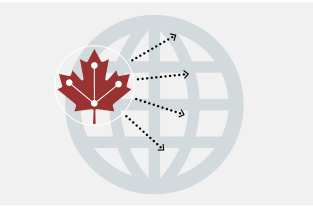
The Canadian Bioinformatics Workshops (CBW) offered through bioinformatics.ca focuses on training in leading technologies and the latest methods being used in computational biology to work with these data.
These include high-throughput sequencing data, protein-protein interaction data, metabolomics, epigenomics data and all the visual, statistical and command-line tools necessary to perform bioinformatics work.
Our Impact at a Glance
CBW’s leadership, faculty and students from across Canada have accomplished measurable advances in knowledge, advancing the field of bioinformatics.
CBW has been teaching Bioinformatics for 25 years
CBW has taught over 200+ workshops
CBW has taught 4000+ students
CBW has offered all its material open for reuse free of charge
Our Management Team
Scientific Director
Platform Manager
Community Hub Coordinator
Our Regional Coordinators
BC Regional Coordinator
Alberta Regional Coordinator
Prairies Regional Coordinator
Ontario Regional Coordinator
Québec Regional Coordinator
Atlantic Regional Coordinator
CBW Education Advisory Board Committee 2024
Each committee member brings expert knowledge and experience, which is critical to the success of CBW as it provides a link to the broader research and training environments that enable maintenance of CBW’s currency and sustainability.
Founder and Retired Scientific Director
B.F. Francis Ouellette is currently consulting in bioinformatics. Francis co-founded the Canadian Bioinformatics Workshops (CBW) and the Scientific Director of bioinformatics.ca from 1998 to 2022. His research interests included biological sequence analysis, genome annotation and database curation. Francis has dedicated his career to Open Science: the data it generates, how bioinformatics is thought and the publications that report them throughout his career and through his work with the CBW and the many scientific advisory and editorial boards he serves on.
Biologist-Bioinformatician, rOpenSci
Stefanie Butland is a biologist-bioinformatician, knowledge-sharer, people-connector and community builder who is motivated by enabling great research. Throughout her career she has been bringing people together at the interfaces of the life sciences, medicine and computational sciences. She is the Community Manager for the rOpenSci Project that aims to transform science by working creatively and proactively to build tools for and to promote data literacy, open science and reproducible research.
Associate Director, Ontario Institute for Cancer Research
Michelle Brazas is the Associate Director for Adaptive Oncology at the Ontario Institute for Cancer Research (OICR), a program encompassing a wide variety of projects from imaging, informatics, genomics and diagnostic development. Previously, she was a Program Manager for bioinformatics.ca, and through ISCB, GOBLET and other endeavours has always been the strongest supporter of open bioinformatics training worldwide.
Biologist and Computer Scientist, Swiss Institute of Bioinformatics
Facilitating learning, lasting partnerships, knowledge management, training and education in scientific environments. Patricia M. Palagi is a biologist and computer scientist by training. In 1997 she joined the Molecular Imaging and Bioinformatics Laboratory in Geneva, one of the 5 pillar laboratories of what would become the SIB Swiss Institute of Bioinformatics one year later. From then on, she coordinated and managed several MSc programs related to bioinformatics, in Geneva and Lausanne. Today she leads the SIB Training Group and my team coordinates training activities within the institute, with Swiss and international partners.
Scientific Affiliate, Princess Margaret Cancer Centre
Dr. Voisin is currently a scientific affiliate at the Princess Margaret Cancer Centre in Toronto in the lab of Dr. Aaron Schimmer. As a bioinformatician, she is applying data analysis using various software and pipelines to high throughput genomics data to answer diverse biological questions. Previously, she worked in Dr. Gary Bader’s lab to apply pathway and network analysis using popular tools like GSEA and visualization using Cytoscape to transcriptomics data. She worked extensively on characterizing the gene signatures of different types of leukemias and other cancer types.
Senior Scientist, Princess Margaret Cancer Centre (PM), University Health Network
Professor, Medical Biophysics Department, University of Toronto
Dr. Haibe-Kains earned his PhD in Bioinformatics at the Université Libre de Bruxelles (Belgium). Supported by a Fulbright Award, he did his postdoctoral fellowship at the Dana-Farber Cancer Institute and Harvard School of Public Health (USA). He is now the Canada Research Chair in Computational Pharmacogenomics and the Scientific Director of the Cancer Digital Intelligence Program at PM. Dr. Haibe-Kains’ research focuses on the integration of high-throughput data from various sources to simultaneously analyze multiple facets of cancer progress and therapy response using machine learning and artificial intelligence methods. Dr. Haibe-Kains’ team analyzes large-scale radiological and (pharmaco)genomic datasets to develop new prognostic and predictive models to improve cancer care.
Manager, Genome Alberta
Research Associate, University of Manitoba / Executive Officer, Cancer Care Manitoba Bioinformatics Core
Regional Coordinator – Prairies, Canadian Bioinformatics Hub
Co-Director/Founder – BioNet Prairie
Associate Professor in Bioinformatics, Faculty of Computer Science, Dalhousie University
Rob (or “Dr. Robert Beiko”, if you want to be all formal about it) is an Associate Professor and Canada Research Chair in Bioinformatics in the Faculty of Computer Science at Dalhousie University. Before coming to Dal in 2006, he was a postdoc in the lab of Mark Ragan at the University of Queensland in Brisbane, Australia. And before that, he completed a PhD in Biology at the University of Ottawa (1998-2003). Although all of his formal training was in biology, an interest in machine-learning approaches, algorithms for identifying important evolutionary events, and visualization of biological data have ultimately led him to put down stakes in Computer Science and collaborate with some of the best in the business here.


Bioinformatics.ca is proud to be a member of GOBLET: the Global Organisation for Bioinformatics Learning, Education & Training and an ISCB Affiliate Group.